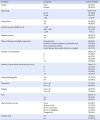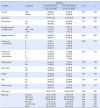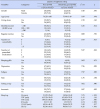Abstract
Purpose
Reported insomnia and decreased sleep quality are common among older adults. The purpose of this study was to identify factors contributing to insomnia and decreased sleep quality among elderly persons living within a community. The data will be verified with Actigraph which is a non-invasive measurement of rest/activity cycles.
Methods
137 participants over 65 years old were recruited from a senior welfare center. Their mean age was 74.07±5.18 years old and majority was women (69.3%). The quality and quantity of nighttime sleep were assessed using Varren-synder-Halper Sleep Scale and a sleep log. Depression and fatigue were assessed using Geriatric Depression Scale Short Form and Fatigue Severity Scale, respectively. Pain was assessed using 11-point Numeric rating scale. An actigraph was used to verify the self-reported sleep.
Results
Ninety-two participants (67.2%) reported insomnia. Sixty-eight subjects (49.6%) reported good sleep. Of the participants, 56.2% reported depression and 33.6% reported fatigue. In logistic regression, depression was related to insomnia (OR=3.09, p=.003). Sleep quality was related to depression (OR=2.13, p=.045) and fatigue (OR=2.24, p=.044). The data from the Sleep logs correlated with data obtained from the actigraph.
Figures and Tables
References
1. Yang SJ, Kim JS. Factors affecting the quality of sleep among community dwelling elders. J Korean Gerontol Nurs. 2010; 12(2):108–118.
2. Cooke JR, Ancoli-Israel S. Sleep and its disorders in older adults. Psychiatr Clin North Am. 2006; 29(4):1077–1094. DOI: 10.1016/j.psc.2006.08.003.

3. Park MS. Fatigue and related factors in elderly people living at home. J Korean Gerontol Nurs. 2009; 11(2):173–183.
4. Giron MST, Forsell Y, Bernsten C, Thorslund M, Winblad B, Fastbom J. Sleep problems in a very old population: drug use and clinical correlates. J Gerontol A Biol Sci Med Sci. 2002; 57(4):M236–M240. DOI: 10.1093/gerona/57.4.M236.

5. Van Someren EJ. Circadian and sleep disturbances in the elderly. Exp Gerontol. 2000; 35(9-10):1229–1237. DOI: 10.1016/s0531-5565(00)00191-1.

6. Wu CY, Su TP, Fang CL, Chang MY. Sleep quality among community-dwelling elderly people and its demographic, mental, and physical correlates. J Chin Med Assoc. 2012; 75(2):75–80. DOI: 10.1016/j.jcma.2011.12.011.

7. Jaussent I, Bouyer J, Ancelin ML, Akbaraly T, Pérès K, Ritchie K, et al. Insomnia and daytime sleepiness are risk factors for depressive symptoms in the elderly. Sleep. 2011; 34(8):1103–1110. DOI: 10.5665/sleep.1170.

8. Suh M, Choi-Kwon S, Kim JS. Sleep disturbances after cerebral infarction: role of depression and fatigue. J Stroke Cerebrovasc Dis. 2014; 23(7):1949–1955. DOI: 10.1016/j.jstrokecerebrovasdis.2014.01.029.

9. Chang KO, Park SJ, Bae DY. The effects of perceived health status, sleep, depression and pain on quality of life by gender in community-dwelling older adults. J Korea Acad Ind Coop Soc. 2014; 15(3):1566–1575. DOI: 10.5762/kais.2014.15.3.1566.

10. Smith MT, Haythornthwaite JA. How do sleep disturbance and chronic pain inter-relate? Insights from the longitudinal and cognitive-behavioral clinical trials literature. Sleep Med Rev. 2004; 8(2):119–132. DOI: 10.1016/s1087-0792(03)00044-3.

11. Ohayon MM. Relationship between chronic painful physical condition and insomnia. J Psychiatr Res. 2005; 39(2):151–159.

12. Van Den Berg JF, Van Rooij FJ, Vos H, Tulen JH, Hofman A, Miedema HM, et al. Disagreement between subjective and actigraphic measures of sleep duration in a population-based study of elderly persons. J Sleep Res. 2008; 17(3):295–302. DOI: 10.1111/j.1365-2869.2008.00638.x.

13. Kang H, Yeon K, Han ST. A review on the use of effect size in nursing research. J Korean Acad Nurs. 2015; 45(5):641–649. DOI: 10.4040/jkan.2015.45.5.641.

14. Edinger JD, Bonnet MH, Bootzin RR, Doghramji K, Dorsey CM, Espie CA, et al. Derivation of research diagnostic criteria for insomnia: report of an American Academy of Sleep Medicine Work Group. Sleep. 2004; 27(8):1567–1596. DOI: 10.1093/sleep/27.8.1567.

15. Buysse DJ, Ancoli-lsrael S, Edinger JD, Lichstein KL, Morin CM. Recommendations for a standard research assessment of insomnia. Sleep. 2006; 29(9):1155–1173. DOI: 10.1093/sleep/29.9.1155.

16. Snyder-Halpern R, Verran JA. Instrumentation to describe subjective sleep characteristics in healthy subjects. Res Nurs Health. 1987; 10(3):155–163. DOI: 10.1002/nur.4770100307.

17. Kim KH. Quality of sleep and sleep disturbance factors of coronary artery disease patients in CCU [master's thesis]. Seoul: Ewha Womans University;2001.
18. Yun Sh. The Effects Of Aroma Inhalation On Sleep And Fatigue In Night Shift Nurses [Master's Thesis]. Seoul: Yonsei University;2008.
19. Littner M, Kushida CA, Anderson WM, Bailey D, Berry RB, Davila DG, et al. Practice parameters for the role of actigraphy in the study of sleep and circadian rhythms: an update for 2002. Sleep. 2003; 26(3):337–341. DOI: 10.1093/sleep/26.3.337.

20. Chae KY, Kripke DF, Poceta JS, Shadan F, Jamil SM, Cronin JW, et al. Evaluation of immobility time for sleep latency in actigraphy. Sleep Med. 2009; 10(6):621–625. DOI: 10.1016/j.sleep.2008.07.009.

21. Kee BS. A preliminary study for the standardization of geriatric depression scale short form-Korea version. J Korean Neuropsychiatr Assoc. 1996; 35(2):298–307.
22. Krupp LB, LaRocca NG, Muir-Nash J, Steinberg AD. The fatigue severity scale. Application to patients with multiple sclerosis and systemic lupus erythematosus. Arch Neurol. 1989; 46(10):1121–1123. DOI: 10.1001/archneur.1989.00520460115022.
23. Farrar JT, Young JP, LaMoreaux L, Werth JL, Poole RM. Clinical importance of changes in chronic pain intensity measured on an 11-point numerical pain rating scale. Pain. 2001; 94(2):149–158. DOI: 10.1016/S0304-3959(01)00349-9.

24. Ahn SH, Choi HK, Kim JH, Kim JL. Prevalence of insomnia and associated factors among community-dwelling Korean elderly. J Korean Geriatr Psychiatry. 2015; 19(1):32–39.
25. Foley D, Ancoli-Israel S, Britz P, Walsh J. Sleep disturbances and chronic disease in older adults: results of the 2003 National Sleep Foundation Sleep in America Survey. J Psychosom Res. 2004; 56(5):497–502. DOI: 10.1016/j.jpsychores.2004.02.010.
26. Cho HJ, Lavretsky H, Olmstead R, Levin MJ, Oxman MN, Irwin MR. Sleep disturbance and depression recurrence in community-dwelling older adults: a prospective study. Am J Psychiatry. 2008; 165(12):1543–1550. DOI: 10.1176/appi.ajp.2008.07121882.

27. Perlis ML, Smith LJ, Lyness JM, Matteson SR, Pigeon WR, Jungquist CR, et al. Insomnia as a risk factor for onset of depression in the elderly. Behav Sleep Med. 2006; 4(2):104–113. DOI: 10.1207/s15402010bsm0402_3.

28. Nicassio PM, Moxham EG, Schuman CE, Gevirtz RN. The contribution of pain, reported sleep quality, and depressive symptoms to fatigue in fibromyalgia. Pain. 2002; 100(3):271–279. DOI: 10.1016/s0304-3959(02)00300-7.





 PDF
PDF ePub
ePub Citation
Citation Print
Print







 XML Download
XML Download